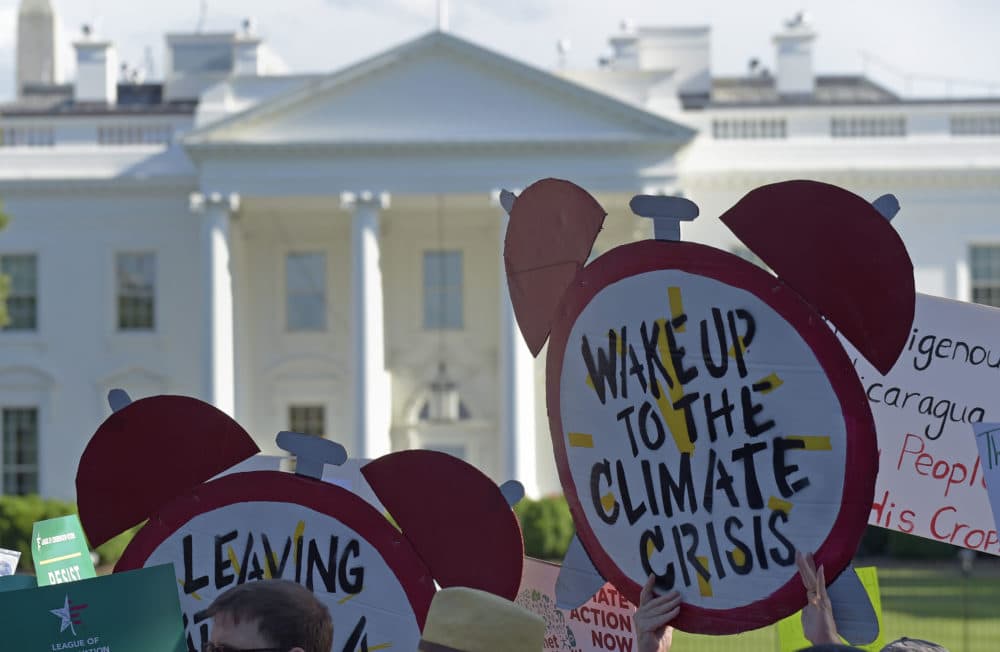Advertisement
Commentary
The Flawed Strategy Of The Green New Deal

Amid progressive cheers, the Green New Deal promises a metaphorical “moonshot” that would put millions to work decarbonizing the U.S. in 10 years, as we “ramp up renewable manufacturing and power production, retrofit every building in America, build the smart grid, overhaul transportation and agriculture, plant lots of trees and restore our ecosystem to get to net-zero [greenhouse gas emissions].”
Oh, and it would also include a federal jobs guarantee for Americans, quality education and health care, healthy food and affordable housing.
The GND’s public rollout was a troubled affair, after co-sponsor Alexandria Ocasio-Cortez had to amend a fact sheet rife with inaccuracies, leaving progressives stammering and Republicans giddy. (Of course, the GOP had already screamed “socialism!”) In reality, the mistakes — that there would be a guaranteed income for Americans “unwilling to work,” for example — were the least serious flaws in the plan, co-sponsored by Massachusetts Sen. Ed Markey.
That was clear before the error-riddled FAQs came to light, when no less a progressive light than House Speaker Nancy Pelosi gave it the cold shoulder.
“It will be one of several or maybe many suggestions that we receive,” Pelosi said on the eve of the GND’s release. “The green dream, or whatever they call it, nobody knows what it is, but they’re for it, right?”
Whatever they call it. Pelosi softened later, a bit: “I welcome all the enthusiasm. I’m very excited about it, and I welcome the Green New Deal and any other proposals.”
The San Francisco Democrat is no climate change denier; she shepherded a 2009 cap-and-trade bill through the House, which the Senate buried. Politics-watchers variously attribute her Green New Deal "meh" to professional judgment (2009 taught her that climate change legislation won’t be a walk in the park) or personal politics (she’s reminding AOC, a Wonder Woman to many on the left, who’s boss.)
Or perhaps Pelosi grasps the Green New Deal’s shortcomings. For all its admirable idealism and the undeniable necessity of its broader objective, what strikes those who aren’t doctrinaire is not what this plan is — but what it isn’t.
Advertisement
It isn’t a bill. As a resolution, it’s an aspiration rather than a blueprint with specific new laws and costs. An Ocasio-Cortez aide told Vox that the array of ambitious projects in the plan would be considered by Congress as individual bills (something that’s already happening without the GND, as with Medicare-for-All proposals).
The GND also may not be the best compilation of climate change strategies. That walked-back fact sheet repudiated carbon taxes, the strategy favored by economists and the one that might attract some Republican support, on grounds that they would stick workers with higher energy prices without first creating affordable, clean, alternative energy. It's a bizarre position, as raising existing gas taxes, not abolishing them, has long been a progressive priority.
The actual GND text keeps vague about revenue measures. But might the fact sheet have inadvertently illuminated Green New Dealers' real, and dubious, thinking about carbon taxes?
Most of all, the Green New Deal isn’t the smartest way to pass a law.
Its animating theory is that you belly up to the negotiation table and lay out a puppy dogs-and-ponies policy. Ask for the moon and, when the inevitable congressional compromises are cut, you’ll wind up with more than if you’d asked for little.
As a resolution, [the Green New Deal] is an aspiration rather than a blueprint with specific new laws and costs.
That theory assumes you don’t lose credibility and support by stuffing your plan with so many pipe dreams as to seem untethered from reality. Charges of utopianism are emanating from quarters other than Far Right Central.
“The idea that in five years or 10 years we’re not going to consume any more fossil fuels is technologically impossible,” says Rep. Peter DeFazio, a founder of the House Progressive Caucus who chairs the Transportation and Infrastructure Committee. (For one thing, the sponsors’ assumption that we’ll have widely usable electric vehicle technology in a decade is dubious.)
Aside from the GOP's climate change deniers and fossil fuel profiteers in industry, everyone agrees the economy must decarbonize. From investing in renewable energy — which is already becoming cost-competitive — to using green technology in the long overdue infrastructure upgrade that Donald Trump claims to support, the GND gets some big things indisputably right.
The sponsors claim that their Green New Deal mirrors the original New Deal’s supposed outside-the-box thinking. They obviously didn’t crack a history book: FDR denuded Social Security of its bolder aspects in order to pass it. That included buying off racist Southern Democrats in Congress by excluding jobs dominated by African-Americans (like domestic work) from eligibility for the benefit, and ditching a suggestion to graft national health insurance onto the bill.
The 1930s ancestors of today’s uber progressives condemned the New Deal for compromised ineffectuality. But the fact that AOC and Markey claim to be FDR’s heirs suggests that history has validated his program, its sails-trimming notwithstanding.
Today’s green duo should prioritize the planks in their resolution that are politically and economically doable and would directly save the planet. We can argue the rest later.
